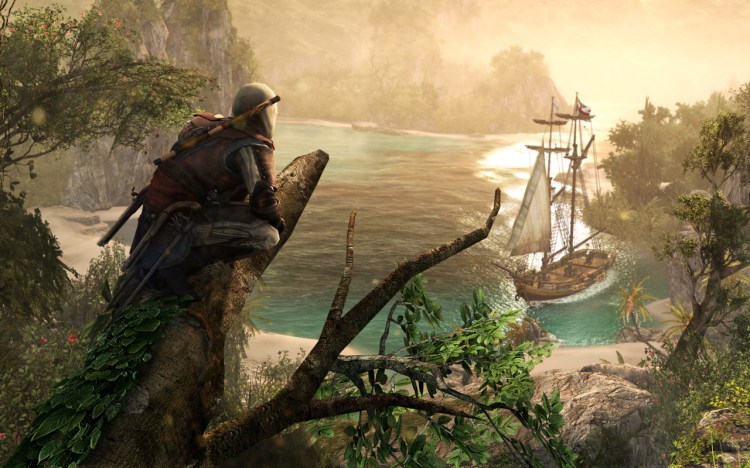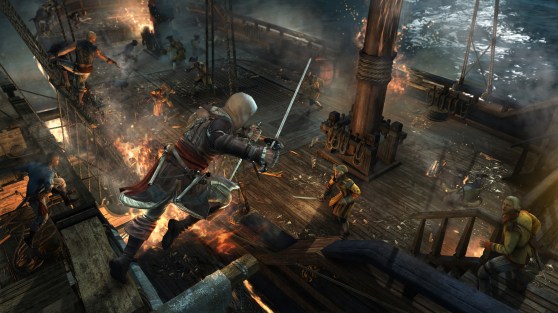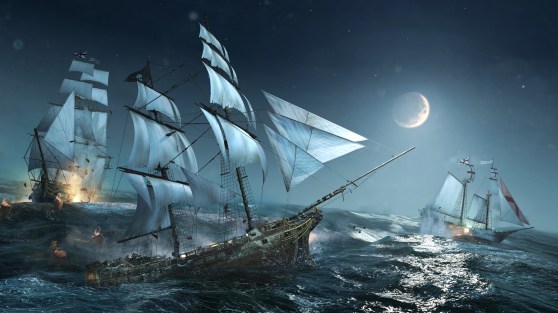It’s fair to say that the various development teams in Ubisoft have made each major release in their flagship franchise better than the one preceding it, and the progression from the first Assassin’s Creed to Assassin’s Creed IV: Black Flag has been stellar.
In fact, ACIV on PlayStation 3 and Xbox 360 is almost too ambitious for its own good. Although it handily delivers a rich, fresh adventure on the dangerous Caribbean Sea, this first release is just flawed enough that you might want to play it on next-generation hardware (or PC) instead.
What you’ll like
Sailing on the Jackdaw
Assassin’s Creed III simply didn’t have enough naval combat, but Ubisoft did the smart thing by making it a main focus in Black Flag. When you officially adopt your ship, The Jackdaw, the game’s world suddenly opens up.
While the controls could’ve stayed the same this time around, seafaring has really been refined with improved targeting and greater weapons variety. (Maxing out the upgrades on your swivel cannons basically makes you a wrecking machine.)
Interactions between ships are also amazingly seamless, and as a result, encounters never feel stale or cumbersome. A single change in weather can turn a simple pirating run into an all-out dogfight, and escalating battles with bigger ships can spell certain death when reinforcements enter the fray.
More than anything, the act of boarding an enemy ship is always a treat. As soon as you hook a crippled deck, the free-for-all fight to eliminate your remaining prey gives you plenty of variety, including shooting down military peons across the bow and diving from the ship’s rigging for air assassinations.
You really can’t avoid upgrading and maintaining the Jackdaw, either. As Edward Kenway and his crew steadily ramp up their activities across the seas, you’re eventually forced to explore a great deal of the game’s map just for the resources needed to keep up with enemy ships.
You’ll find treasure everywhere
It’s extremely difficult to get bored in Assassin’s Creed IV, and if it wasn’t for the inherent historical limitations, I would argue that this open world is just as engaging as Grand Theft Auto V’s.
No matter what you do in the game, you’ll have to constantly forage for money, materials, and resources to get ahead. That can involve anything from plundering a plantation to uncovering buried treasures, and ACIV is continually giving you new reasons to plumb the depths of each island’s surroundings.
Just about everywhere you look, you’ll uncover valuable assets: sunken shipwrecks, underwater caverns, smuggler’s hideouts, military forts, local taverns, dense jungles, and so much more.
Why don’t you just shoot him?
Despite not being a purebred Assassin, Captain Kenway is probably the most capable recruit that the secret order has ever seen.
Now that you can dual wield swords and freely shoot guns in third-person view, it’s hard to care about being stealthy about your kills anymore. With hidden blades, rifles, blow darts, and more, murdering enemies is almost sadistically fun.
Free-aim shooting also makes lots of potentially frustrating assassination attempts really easy, but your mileage may vary on how this affects the overall challenge. Personally, I didn’t mind the extra option one bit.
The big cities
If most fans could level one major complaint at Assassin’s Creed III, it would be that the American frontier wasn’t really the most thrilling environment for exploration. Save for the cliffs and dense stretches of forest, the landscape felt very flattened out while the settlements left a lot to be desired.
In contrast, Black Flag’s cities and islands are gorgeously laid out, with plenty of attention devoted to vertical space across several huge maps.
Between Havana, Kingston, and Nassau, you’ll get a little bit of architectural flavor from each of the core Assassin’s Creed titles, with each city paying homage to previous settings in the saga. Of course, they’re all dotted with plenty of activities to keep you busy between major missions, so good luck clearing each locale’s laundry list of riches and resources.
Meet Edward Kenway
The saga of main characters Desmond Miles, Altair, and Ezio may have had a conclusion in Assassin’s Creed III and Revelations, but the trade-off here is more than worth it to introduce Edward Kenway.
Even though the story initially plays the fish-out-of-water card with Kenway inserting himself into the war between the Assassins and the Templars, the story in ACIV is far more interesting with a new face that isn’t privy to the long, complicated that history fans have followed for the last half-decade.
Moreover, the real strength of Kenway’s story is his fresh perspective and how his quest relates to you as a player.
For the first time in the Assassin’s Creed series, we finally have a lead character whose main goal in the game directly relates to you as a player: become the biggest badass on the open seas by conquering as much terrain and gathering as many riches as possible.
Whether intentional or not, that’s some brilliant theming, and it’s also an element that makes this a great point for non-veterans to enter the franchise. Although the series’ past eventually catches up to the narrative here, seeing the Assassins’ and Templars’ war through Kenway’s commoner eyes makes the backstory more interesting.
What you won’t like
Glitches, bugs, and nitpicks
Early into the development of Assassin’s Creed IV, Ubisoft made the decision to have the PlayStation 3, Xbox 360, Wii U, PC, PlayStation 4, and Xbox One versions all be produced as the same game.
That decision may be the reason for the occasional technical issues in ACIV; the PS3 and Xbox 360 feel like they can barely handle everything the game’s trying to do. Throughout my campaign I saw characters floating in mid-air, running in place, getting stuck in walls, ignoring gunshots to the face, and generally spazzing out while in combat.
Amid all those distractions and bouts of slowdown, it’s very evident that this game is better suited for high-end PCs and next-gen consoles.
Multiplayer feels limited
Multiplayer has been one of the best parts of several Assassin’s Creed titles, but this time it doesn’t provide near as much fun as the main campaign.
You do have great amounts of character customizations and game mode modifications available to you, but the maps feel downright restrictive in comparison to the go-anywhere, do-anything single player mode and its huge islands. Despite having so many variants of deathmatch, tag, capture the flag, and zone defense, even the best of the multiplayer isn’t as compelling as the main campaign.
With all the focus on naval combat, it feels like a missed opportunity to not incorporate it with the online gameplay. At the very least, the multiplayer maps feel like they should be more expansive.
Knowing you could soon play a better version
As good as Assassin’s Creed IV may be on Xbox 360 and PlayStation 3, the paradox is that you probably shouldn’t buy it if you’re in the market for a PS4 or Xbox One.
All the impressive technical demos of ACIV that Ubisoft has been showing off really take the shine off the current-gen versions, and the most discerning eyes will certainly notice the difference in textures, particle effects, environmental elements, lighting, and a few other special effects.
If you can wait an extra couple of weeks (or three), you might want to hold out for the version that didn’t get downgraded in transition.
Conclusion
Assassin’s Creed IV: Black Flag is definitely the high point of the franchise so far, and the expansive world will have you lost in its depths for hours on end. It’s going to be exciting to see where Ubisoft takes the saga next (and you’ll get a few exciting clues if you pay attention to the Abstergo Entertainment segments).
Even though the PS3 and Xbox 360 aren’t equipped to give you the best ACIV experience, the core adventure here is more than good enough for fans who won’t be burying their current-gen consoles any time soon.
Score: 85/100
Assassin’s Creed IV: Black Flag comes out for the PlayStation 3, Xbox 360, and Wii U on Oct. 29. The publisher provided GamesBeat with PS3 and Xbox 360 copies for the purpose of this review.
VentureBeat's mission is to be a digital town square for technical decision-makers to gain knowledge about transformative enterprise technology and transact. Learn More














